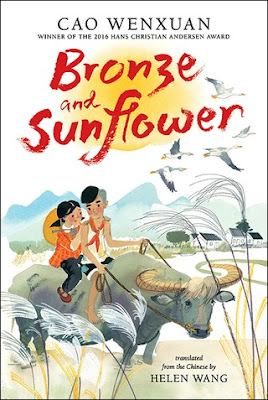Sunflower, 7, and her father have been living in the country, in a Cadre School for a while. Her father is an artist, a sculptor, well-known for his beautiful sunflowers cast in bronze. Sunflower is the only child at the school and very lonely. Since she doesn't go to school, she often watches the children across the river playing and laughing. When her father dies unexpectedly, women from the Cadre School take Sunflower across the river, to the small village of Damadai, to see if anyone would take her in.
Only Bronze's family, the poorest in the village, is willing to accept Sunflower and make her their own. Bronze, a few years older than Sunflower and just as lonely, hasn't spoken since he was 5 and witnessed what was to him a traumatic event.
Bronze and Sunflower are soon inseparable, seeming to understand each other without the need to speak. Over time, the now-siblings and their loving, but poor family, endure and survive many hardships such as famine, locusts, bitter cold winters, and a fire that destroys their home. The children share not just friendship, but many adventures and good times, as well, like punting little boats on the river, riding to school together on Bronze's water buffalo, even though only Sunflower is a student, or Bronze letting Sunflower sit on his shoulders so that she is high enough to see the circus over everyone else's head, and even working together as a family making reed shoes to sell in the January market to pay for Sunflower's schooling or grandmother Nainai's medical needs.
Bronze and Sunflower is a beautifully written story about the many sacrifices that were made by Bronze's family when they decided to take in Sunflower, how they lived poor but with great dignity and love, and how they continued to do that even when forced to make the greatest sacrifice of all.
Chinese life during the cultural revolution is not a usual subject for a children's book, but Cao has managed to present a picture of rural life that neither sugarcoats nor romanticizes it. In fact, he has produced such a heartwarming story that it has a feeling of timelessness about it despite the time it is actually sent in, mainly because Mao's China takes a backseat to the traditional values of family that the book really demonstrates.
Cao grew up during the 1960s and 1970s and experienced China at that time first hand, which give his novel a real feeling of authenticity. His descriptions, though beautifully rendered, are often heartbreaking at the same time.
Bronze and Sunflower is a large book, 400 pages long. It is a story of day to day survival, so there is not really a big central conflict. I have to wonder if it will appeal to young readers as much as it appeals to adults. My 12 year old self would have loved getting immersed in the lives of Bronze and Sunflower, but I didn't grow up with as many distractions as kids have today (video games, screens, instant gratification, etc. I'm not putting these things down, just pointing out how life has become faster). Though I highly recommend it for its thematic portrayals of community, family, loyalty, and poverty.
On a personal note: my Kiddo has been home visiting and when I asked her if her husband's parents, who both grew up in the midst of the cultural revolution, ever talk about it, she said not, never. They refuse to say anything, but her husband's grandparents did tell her about how hard life was in those days. I'm guessing they would have really appreciated Bronze and Sunflower.
Bronze and Sunflower won the 2016 Hans Christian Anderson award and was translated from Mandarin by Helen Wang, who won the 2017 Marsh Award for Children's Literature in Translation for it.
You can find out more about Cao Wenzuan in a New York Times interview HERE
On a personal note: my Kiddo has been home visiting and when I asked her if her husband's parents, who both grew up in the midst of the cultural revolution, ever talk about it, she said not, never. They refuse to say anything, but her husband's grandparents did tell her about how hard life was in those days. I'm guessing they would have really appreciated Bronze and Sunflower.
Bronze and Sunflower won the 2016 Hans Christian Anderson award and was translated from Mandarin by Helen Wang, who won the 2017 Marsh Award for Children's Literature in Translation for it.
 |
| Original Chinese Cover |
And Zoe at Playing by the Book has a wonderfully informative interview with Helen Wang HERE
If an interest in translated children's Chinese books has been kindled, you
might be interested in Helen Wang's blog Chinese Books for Young Readers
Classroom and Home School teachers can find a useful PDF discussion guide
HERE
This book is recommended for readers age 9+
This book was an EARC received from NetGalley
If an interest in translated children's Chinese books has been kindled, you
might be interested in Helen Wang's blog Chinese Books for Young Readers
Classroom and Home School teachers can find a useful PDF discussion guide
HERE
This book is recommended for readers age 9+
This book was an EARC received from NetGalley



































No comments:
Post a Comment